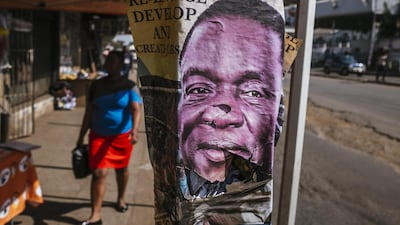Zimbabwe's first election since the fall of Robert Mugabe has resulted in victory for the long-ruling Zanu-PF – in terms of parliamentary seats, at any rate; whether the incumbent Emmerson Mnangagwa has also won the presidential race against Nelson Chamisa of the Movement for Democratic Change (MDC) won't be known until later.
How free and fair these polls have been matters a great deal, as does the worrying outbreak of violence last night as discontent at the announced results manifested itself. For this is in effect Zimbabwe's second chance at democracy. George Walden, one of the British negotiators of the Lancaster House agreement which led to independence in 1980, once wrote that after Robert Mugabe came to power as free Zimbabwe's first prime minister (the executive presidency came later), "everything about him seemed to change for the better".
The “glacially superior Marxist terrorist” with “plenty to be bitter about”, as Walden put it, appeared initially to be magnanimous both to the white minority and to his former opponents in the liberation struggle. The country was expected to be a success story.
But Mr Mugabe’s ruthless, dictatorial streak soon emerged. Up to 30,000 of the Ndebele ethnic group – deemed to be “dissident” – were massacred in the 1980s, elections were blatantly rigged and the economy was wrecked so badly that at the time of Mr Mugabe’s removal last November, only 600,000 people out of a population of 13 million were in formal employment. Inflation stood at 348 per cent.
By the end, the old man had become a tyrant with no redeeming qualities at all.
Mr Mnangagwa – known as "the crocodile" – was at Mr Mugabe's side for nearly all of those 37 years and his hands are far from clean. But he seems to have persuaded Zimbabweans that he really does represent change, both from the demented despotism of his predecessor and from his disastrous policies that saw Zimbabwe come close to being regarded as a pariah state.
The lustre that long clings to liberation movements in Africa will probably have helped Zanu-PF, particularly in the rural areas that appear to have swung this election. So will the disorganisation and factionalism that has plagued the MDC for years and the fact that its leader Mr Chamisa might be charismatic but he also displays a Trump-like disregard for the truth, making some ludicrous promises and being caught out telling complete fabrications.
The international community has already cautiously welcomed Mr Mnangagwa since he took over the presidency last year – not least on the grounds that any alternative to Mr Mugabe had to be an improvement. The question now is whether he can deliver. And that means not just swift and tangible economic progress, but also restoring the independence of democratic institutions, the judiciary and the media and helping instil respect for the democratic process, tolerance and pluralism.
Another country held elections last Sunday, which provided an example of how a fresh chance at democracy can go badly wrong.
In 1993, the United Nations Transitional Authority in Cambodia organised the first election after decades of civil war, aiming to kickstart a new era of human rights in a society that would uphold liberal values. By 2014, however, as Sebastian Strangio wrote in his masterly book Hun Sen's Cambodia, "the democratic project had produced a mirage on the Mekong, an illusion of western democratic forms", behind which the long-serving prime minister "ruled in the traditional way, through an iron fist and a canny manipulation of his country's history and culture".
In November 2017, the main opposition party – which had given Mr Hun Sen a run for his money in the 2013 elections – was dissolved by the Supreme Court. After last weekend's polls, his Cambodian People's Party claimed to have won every single seat in the country's parliament. No wonder there has been much talk of the "death of democracy" in Cambodia.
The signs so far in Zimbabwe are mixed. The polls were conducted peacefully – an achievement in itself – but there have been allegations of vote-rigging and ghost voters while one woman claimed to have registered three times in three different areas.
Home Affairs Minister Obert Mpofu might have been technically within his rights to warn MDC leaders who prematurely announced they had won that they risked jail but it hardly spoke to the openness and generosity of spirit that one hoped would characterise these elections. The reaction of security forces after protests erupted in Harare, the country’s capital, last night – with one man shot dead – are not encouraging either.
Still, whatever the results, many challenges lie ahead. If Zanu-PF are confirmed as having won freely and fairly, they have a country to remake. They must also come up with a narrative about their post-independence history thus far that acknowledges Mr Mugabe's many mistakes but which still honours his liberation leader status.
For all countries exalt their independence struggles and while citizens can accept that heroic founder-figures might fall from grace, constant condemnation of their misdemeanours can be hard for national pride to take. Transitions need compromise. In many cases, that also means past misdeeds go unpunished – which will most certainly be the case in Zimbabwe, given that Mr Mnangagwa was security minister during the army massacres of the 1980s.
Zimbabwe will need the outside world's assistance and encouragement and the international community should come bearing carrots rather than sticks – while still scrutinising the new government and ensuring it adheres to its promises on freedom and democracy.
For it would be a tragedy if the “mirage on the Mekong” were to be replicated by a “mirage on the Mukuvisi”, which runs close to Harare. This second chance is a precious gift. Don’t let Zimbabwe’s politicians – of whatever stripe – squander it again.
Sholto Byrnes is a senior fellow at the Institute of Strategic and International Studies Malaysia


